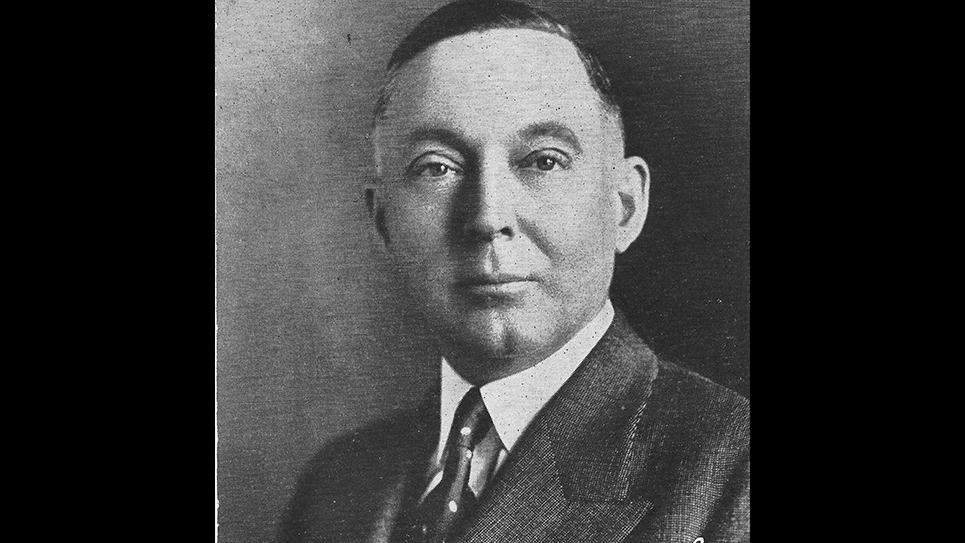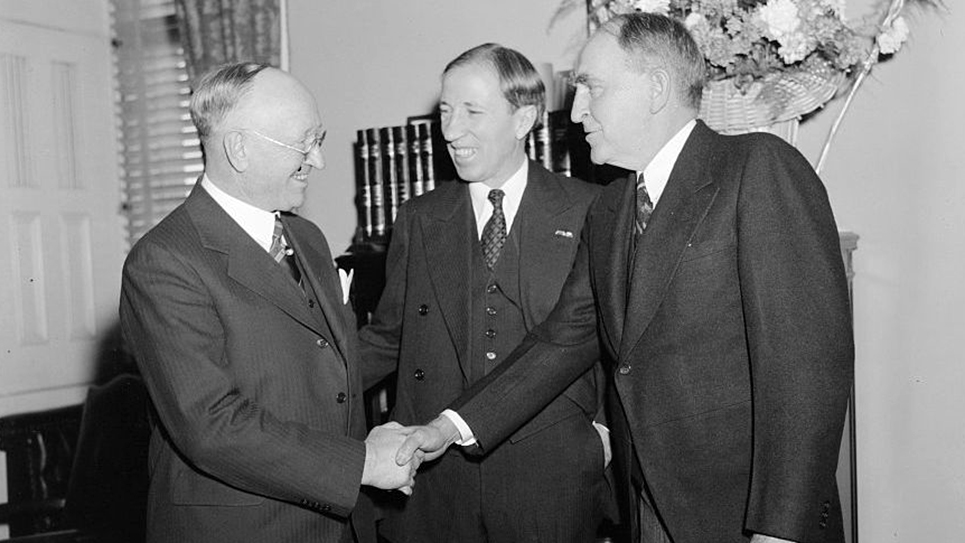Maine’s ‘Mr. Democrat’
Louis Jefferson Brann
By Ray Hill
Years ago, Maine was one of the most reliably Republican states in the nation. While Democrats there weren’t quite as rare as Republicans were in the South at the time, they were used to losing elections. Even as Franklin D. Roosevelt almost swept every state in his 1936 reelection bid, he lost only two: Maine and Vermont. During the age of Roosevelt, Louis Jefferson Brann proved to be more successful in the Pine Tree State than even FDR. While President Herbert Hoover was easily outrunning Franklin Roosevelt in Maine in 1932, Louis J. Brann eked out a victory over GOP gubernatorial nominee Burleigh Martin by 2,358 votes. For a decade, Louis J. Brann was “Mr. Democrat” in the Republican State of Maine.
When Louis J. Brann was first elected governor, Maine held its general election in September rather than November like the rest of the country. Hence the slogan, “As Maine goes, so goes the nation.” Since the Civil War, only twice had Maine voters gone to the polls and elected Democrats as their governor; those elections had occurred in 1878 and 1914.
While his majority was small, Brann ran ten times better than FDR in Maine. The Lewiston lawyer had accrued considerable personal popularity in his native state and the Portland Evening Express remembered the former governor as the greatest “publicist” in the state’s history. Brann had won that title through his relentless promotion of the virtues and wonders of Maine. Governor Brann tirelessly bragged about the recreational opportunities offered by Maine and his promotion of their state pleased tens of thousands of Mainers.
“Brann had most of the attributes common to good salesmen and good politicians. He dressed smartly, could remember names as well as faces, was genuinely interested in people and their problems, listened well and talked well,” the Evening Express wrote when the former governor died. “He was also always ready to conciliate – – – a trait that helped him enormously in dealing with a predominantly Republican legislature and a wholly Republican Executive Council.” Maine was one of those New England states that elected an executive council, which approved or disapproved of programs recommended by the governor. Executive councils were a relic of the past and thought to safeguard against dictatorial governors. Maine abolished its own executive council in a statewide referendum in 1975.
Brann’s ability to speak extemporaneously on virtually any subject at any time made him an effective salesman for his state, as well as a popular speaker to audiences in Maine. His speaking skills also helped him become a highly successful attorney. Originally, Louis J. Brann had been a Republican and later became a Democrat. Brann’s first foray into statewide politics was a failed bid for the Democratic nomination for governor in 1926.
There were those critics in the Pine Tree State who believed Governor Brann got along better with Maine Republicans than he did New Dealers in Washington. Evidently, the governor and the Roosevelt Administration had difficulties over patronage matters in Maine, causing Brann to pay only lip service to the president. That changed in 1940 when Louis J. Brann was running for the United States Senate for the second time. The former governor gave full-throated support to President Roosevelt’s foreign policy.
Louis J. Brann retained a lifelong interest in athletics and sports, especially baseball. Brann had been invited frequently while serving as governor to attend big league ball games. Brann invited numerous figures prominent in politics, entertainment, business and sports to attend functions at the governor’s mansion, as well as his fishing parties. Governor Brann initiated “Maine Summer Visitor Day,” which always drew throngs of people to the state.
Brann had earned his political spurs by serving in a variety of positions and was elected mayor of Lewiston five times. Brann also served in Maine’s House of Representatives, representing Lewiston. Like most politicians of his day, Louis J. Brann was a joiner, holding memberships in the Grange, Elks, Knights of Pythias, Lions and Rotary clubs.
Brann proved his political mettle by winning reelection to another two-year term as governor in 1934, beating Republican nominee Alfred Ames with quite nearly 54% of the votes cast. Louis J. Brann was the first Democrat in Maine’s history to win reelection as governor. Today Maine is considered a more liberal state and the state’s most enduring public official is Senator Susan Collins, a Republican. Senator Collins, however, is much more moderate than many Republicans sitting in the Senate. In 1934, Maine was a more conservative state, a fact recognized and acknowledged by Governor Louis J. Brann, who maintained some distance from much of the New Deal. As Maine’s votes would be heralded throughout the country in advance of the general election for the rest of the country, both parties sent a host of speakers and money into the Pine Tree State to affect the outcome. GOP Senator Frederick Hale, who was seeking another six-year term, told Mainers that to reelect Governor Brann was to endorse the New Deal. Republicans were both shocked and appalled by the results on Election Day. Governor Brann made an effective argument when he pointed to the federal spending in Maine through Roosevelt’s New Deal and compared it with what had been received in rock-ribbed Republican New Hampshire. Voters voted their pocketbooks.
Congressman Carroll Beedy, thought to be a safe bet for reelection, had been defeated by Simon Hamlin, who described himself as a plain old “dirt farmer.” Governor Brann easily beat Ames, who was described as “an elderly retired lumber merchant,” who was unable to keep up with the give-and-take of an election contest. Senator Hale barely survived, winning by only 1,200 votes. The New York Herald Tribune huffed, “Maine Votes For Santa Claus.”
Louis J. Brann was one of several governors who attended the “million dollar fight” of the century between Jack Dempsey and Gene Tunney. Ringside seats were selling for $250 for two (almost $5,500 today).
While he worked well with the Republican majority in his state, Governor Louis J. Brann did not hesitate to differ with the other party or his own. Brann nominated Frederick G. Payne, then the mayor of Augusta, to serve on Maine’s Public Utilities Commission in 1935. The executive council refused to approve the appointment. Governor Brann stubbornly nominated Payne six times, only to see the executive council refuse to approve Payne’s nomination six times. Finally, Payne asked the governor to withdraw his name from consideration which Brann did reluctantly. Brann released part of a letter to Payne that said, “I prophesize for you, after you have ceased to be mayor of Augusta, a continuation in the public service, and the establishment of a reputation for ability, fairness, for judgment and for character and attention to public affairs that will win the further commendation of your fellow citizens.” Payne was elected governor the year Brann died.
As Governor Brann’s second term was expiring in 1936, he turned his eye toward the United States Senate. The incumbent was Wallace H. White Jr., a gentle, unassuming, first-term senator who had first been elected to the House of Representatives in 1916. White was the scion of a political family; his grandfather, William P. Frye, had served thirty years in the United States Senate from Maine. Without a doubt, Louis J. Brann was the strongest candidate the Democrats could field against Senator White. The end result was a photo-finish, with Brann losing by 4,648 votes.
Brann was not done with politics, announcing he would challenge GOP Governor Lewis O. Barrows for reelection in 1938. The former governor intended to return to the statehouse and ran a strong, but ultimately losing campaign. Brann had been hindered in his campaign by voters frowning upon the governor’s seeking a third term. Perhaps the most notable aspect of the campaign had been Rudy Vallee, a popular star of radio and motion pictures, campaigning for the former governor.
Louis J. Brann made his last statewide campaign in 1940 when he was the Democratic nominee for the United States Senate to succeed retiring Senator Frederick Hale. Brann’s opponent was Congressman Ralph Owen Brewster, something of a controversial figure even inside Maine’s Republican Party. Waging a fighting campaign, the former governor was swamped on Election Day as the Pine Tree State was returning to its Republican roots as the effects of the Great Depression were ebbing. Brann carried only two of Maine’s sixteen counties in the general election.
After leaving office as governor, Brann divided his time between Lewiston and Boston; Brann maintained his hometown law practice as well as a partnership with Joseph Ely, the former governor of Massachusetts.
In 1942, Louis J. Brann ran for public office for the last time. The former governor had moved from his home, which was located in Maine’s Second Congressional District to Falmouth, which was in the First District. Brann hoped to take advantage of a bitter primary contest between incumbent Congressman James C. Oliver and challenger Robert Hale. Brann also believed his chances for election were vastly improved by the thousands of workers who had come to Maine for work in the state’s shipyards. Brann had no difficulty in winning the nomination of his party and campaigned as an all-out supporter of President Roosevelt’s war policies. Brann raised the issue of Hale having once penned an article entitled, “But I, Too, Hate Roosevelt.” Robert Hale defended himself, saying, “I am probably the most outspoken advocate in Maine of President Roosevelt’s foreign policies. Also, I guess I am the most outspoken critic of his domestic policies.” Hale’s answer deflected much of Brann’s criticism.
The Second World War was not going well for the Allied powers in 1942 and the voter turnout was low, and the Republicans made an excellent showing that year, although the Democrats kept control of both Houses of Congress. Brann lost to Hale, winning just over 43% of the ballots cast. The defeat effectively ended Louis J. Brann’s electoral career.
Louis J. Brann, suffering from what relatives described as a “bad cold,” was reading in bed when he suddenly closed his eyes and died in February 1948. The rites for the former governor drew both the mighty and the common to attend the funeral. Brann’s body was brought home to Lewiston for both the funeral rites and burial.
The Portland Press Herald published an editorial lauding the former governor, which might well serve as a reminder of the fleeting nature of fame. “There was a time, and not so long ago, when the name of Louis J. Brann was on every Maine tongue. No man of his time so completely captured the news of the day and became so interesting and important subject of conversation.” The Press Herald acknowledged the former governor’s personal popularity and the legion of friends Brann had retained even after his political career was over. The newspaper refuted the idea Louis J. Brann’s reelection had much to do with Franklin Roosevelt or the New Deal, but rather had been accomplished through the governor’s “own personality and ability.” The Press Herald noted Brann’s subsequent defeats at the polls “was in no sense” the result of any “lack in himself.” The editorial pointed out the fact Brann had quite nearly toppled “the immensely popular Senator Wallace H. White in 1936 was proof of the esteem in which people of all parties here in Maine held him.”
The Press Herald editorial quoted a judge who called Louis J. Brann “able, kindly, genial, with a heart that beat in unison with that of the common man.”
The Portland Evening Express published its own editorial on the passing of former governor Louis J. Brann, noting he was widely known all over the state as “Lou” or “Louie” to thousands of Mainers. “First and last, he was a politician,” the Evening Express stated, “but a politician in the finest sense of the word: he liked people.”
To be remembered fondly by both friends and foes in death is quite a tribute to a life well lived. In fact, there may not be any greater tribute than that.
© 2024 Ray Hill







